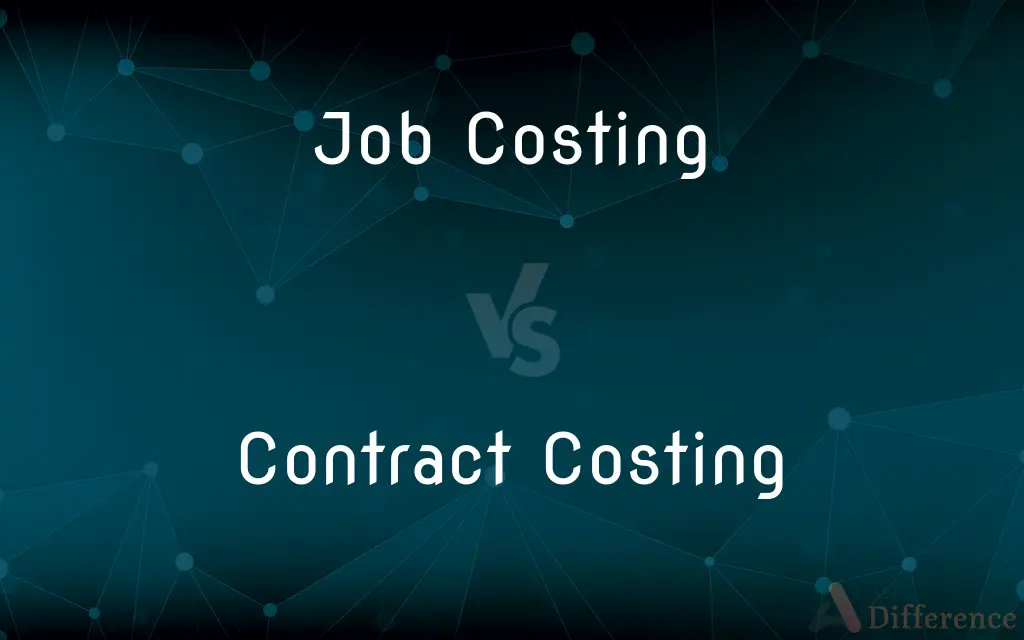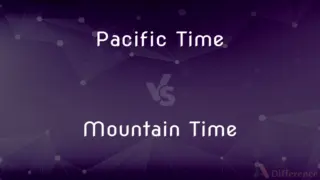Job Costing vs. Contract Costing — What's the Difference?
By Tayyaba Rehman — Published on October 18, 2023
Job costing assigns costs to individual tasks or batches, often in manufacturing, while contract costing aggregates costs for larger, extended projects, like construction.

Difference Between Job Costing and Contract Costing
Table of Contents
ADVERTISEMENT
Key Differences
In the realm of cost accounting, Job Costing and Contract Costing are techniques used to allocate and track costs. Job Costing typically relates to shorter-term projects where costs are assigned to individual tasks or batches, ensuring every specific job's expenses are accurately tracked. On the other side, Contract Costing is used for more extensive projects that span over longer periods, like construction endeavors.
Industries such as manufacturing often employ Job Costing because products are often made in batches. The costs for materials, labor, and overhead for each batch or job are accumulated separately. Contract Costing, however, is predominantly used in industries like construction where the project is vast, unique, and extended over a longer period.
Job Costing provides detailed insights into the cost structure of specific tasks, helping organizations to understand where they incur most costs and where they might find savings. Contract Costing, conversely, gives a broader perspective, allowing businesses to monitor a project's overall financial health and ensure it remains on budget over its lifespan.
When it comes to scalability, Job Costing might not always be suitable for more extensive projects due to the intricacies involved in tracking numerous small tasks. In contrast, Contract Costing may not be ideal for smaller projects, as it aggregates costs at a higher level, which might overlook the finer details.
Both Job Costing and Contract Costing are vital in their respective domains. While Job Costing ensures that every product batch or job is cost-effective, Contract Costing ensures that larger projects remain financially viable from start to finish.
ADVERTISEMENT
Comparison Chart
Duration
Short-term projects/tasks.
Longer-term, often spanning years.
Usage
Used in manufacturing, batch processing.
Predominantly in construction, large projects.
Detail Level
Highly detailed for individual jobs or tasks.
Aggregated for the entire contract.
Scale Suitability
Suitable for smaller tasks or batches.
Suitable for larger, extended projects.
Costing Objective
Tracks specific task costs.
Monitors overall project budget.
Compare with Definitions
Job Costing
Tracks materials, labor, and overhead per job.
Job Costing allowed the mechanic to give an accurate price for each car repair.
Contract Costing
Tracks cumulative costs against contract value.
Using Contract Costing, the firm ensured the bridge's construction was profitable.
Job Costing
Used for short-term, distinct projects.
For the custom jewelry order, Job Costing was the preferred method.
Contract Costing
Offers a broad financial view of a project.
Through Contract Costing, the city monitored the expenses of the new park over three years.
Job Costing
Allocation of costs to specific tasks or jobs.
Using Job Costing, the factory assessed the cost of producing each toy batch.
Contract Costing
Allocation of costs over extended projects.
For the new skyscraper, Contract Costing was essential to keep the project on budget.
Job Costing
Provides detailed cost structure insights.
Job Costing helped the bakery understand the expenses for each pastry type.
Contract Costing
Used predominantly in construction industries.
The road development used Contract Costing to ensure financial viability.
Job Costing
Often employed in batch production scenarios.
The pharmaceutical company used Job Costing for its medicine batches.
Contract Costing
Focuses on the entire contract's cost structure.
The dam's construction was evaluated using Contract Costing to prevent budget overruns.
Common Curiosities
What's the primary use of Job Costing?
Job Costing is mainly used to allocate costs to specific tasks, often in manufacturing or batch production.
Which costing method gives more detailed insights?
Job Costing offers more detailed insights into specific tasks or jobs.
In which industry is Contract Costing predominantly used?
Contract Costing is primarily used in the construction industry.
Can Contract Costing be used for short-term projects?
While possible, Contract Costing is generally more suitable for longer, extended projects.
Can a manufacturing company use Contract Costing?
Yes, but Job Costing is typically more suited for manufacturing scenarios.
How does Job Costing benefit a business?
Job Costing helps businesses understand costs at a granular level, ensuring each task or batch is cost-effective.
Which method is more scalable for larger tasks?
Contract Costing is more scalable and suitable for vast projects.
How does Contract Costing ensure a project remains on budget?
Contract Costing allows for continuous monitoring of cumulative costs against the contract's value.
Is Job Costing suitable for a multi-year project?
Typically, Contract Costing would be more appropriate for multi-year projects.
Is Contract Costing suitable for unique, one-time projects?
Yes, Contract Costing is ideal for large, unique projects that span longer durations.
Can Job Costing be applied to services?
Absolutely, Job Costing can be applied to specific service tasks or jobs.
Can both methods be used simultaneously?
While they serve different purposes, a large contract might have smaller jobs within it, employing both methods.
Share Your Discovery

Previous Comparison
Booster vs. Router
Next Comparison
Pacific Time vs. Mountain TimeAuthor Spotlight
Written by
Tayyaba RehmanTayyaba Rehman is a distinguished writer, currently serving as a primary contributor to askdifference.com. As a researcher in semantics and etymology, Tayyaba's passion for the complexity of languages and their distinctions has found a perfect home on the platform. Tayyaba delves into the intricacies of language, distinguishing between commonly confused words and phrases, thereby providing clarity for readers worldwide.
















































